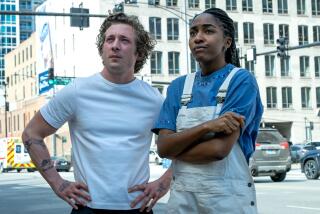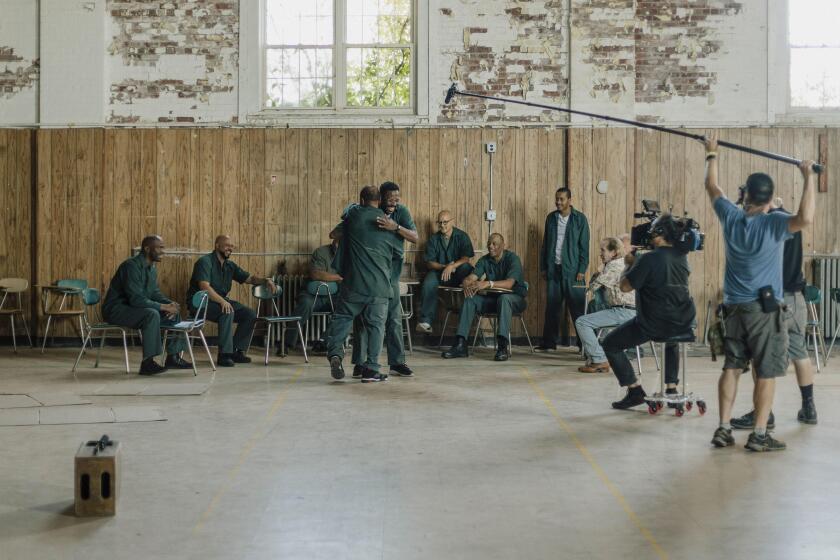STAGE REVIEW : Jones Rolls Out the Thunder, Wilson the Words, in ‘Fences’
James Earl Jones and Troy Maxson embraced each other with a whoop and a holler Wednesday night on the stage of the Doolittle Theatre. I missed you, man.
Jones played Maxson in August Wilson’s “Fences” for a year on Broadway, and played him in resident theater before that. Last spring he left the role to do other work.
But they were bound to reunite. This is a role that calls out the giant in this actor, a part that takes him up to the top of the mountain. Jones has played King Lear, but he has never been closer to the life force than he is at the Doolittle. The thunder comes when Jones calls it, and the little moments are as perfect as a robin’s egg.
All this in a play about a garbage man. Set in 1957, “Fences” is a tribute to a generation of black fathers who may have had their problems with the bottle and with women, but who brought that paycheck home every Friday night.
No absentee fathers, these. No saints, either. Wilson is honest about the hostility that a responsible man can put out. Troy rules his roost with an iron hand. If nobody else in the world calls him “sir,” his teen-age son (Courtney Vance Jr.) will learn to do so.
For an example of thunder, take the scene where Jones informs Vance that a man is under no obligation to love or even to like his son. A father’s only duty to his child is to feed it, and an end will come to that. This is not some benign little sermon, delivered for the “boy’s own good.” It is an ultimatum and it will have consequences.
For a private moment, take the scene where Jones needs to confess to his wife (Lynne Thigpen) that he is going to become a father, by another woman. He works himself up to the brink of the confession, sees the trust in his wife’s eyes, and can’t leap.
When he does, it’s the end of his reign as head of the family. And now, interestingly, Troy gets down to serious work on that fence for the front yard.
It is the last we see of him. Yet his presence is palpable in that last scene. Or perhaps it’s his absence that is palpable. In any case, the fence and the family are still standing. Here, “Fences” brushes against mystery, without losing its sureness as a front-stoop play.
Elsewhere--when Lloyd Richards’ actors give you a chance to think about it--you sense contradictions in the play. Clearly Wilson sees contradiction as a part of life. But Troy sometimes seems to be an attempt to epitomize all those fathers at once.
On the one hand, he’s so blindly suspicious of the white power structure that he won’t let his son take an athletic scholarship to a good college. On the other hand, he knows how to use the white power structure at work, getting himself and the other black garbage handlers an upgrade to the status of driver.
He goes to another woman, he says, because he’s uptight at home. We can see how guarded he is with his son. But what could be more relaxed, more at ease, than Troy hoisting a bottle on the front stoop after work, on a Friday night? When he smiles, it’s from the bottom of his toes. And his wife is part of his contentment.
Like Walt Whitman, Jones sees no problem with these contradictions: He simply embraces them. He adds a quality that one hadn’t noticed so strongly when “Fences” was on Broadway. A sense of the supernatural. There’s a hoodoo out there, a barking dog that’s going to hunt him down, and he’s always aware of it. Here we think of O’Neill and the Greeks--and the wandering hero of Wilson’s last play, “Joe Turner’s Come and Gone.”
Yet “Fences” is firmly planted in a poor man’s front yard. (You wouldn’t be surprised to see a cat trot down that cobblestoned alley, in James D. Sandefur’s setting.) And the secondary characters are as solid and real as Troy is.
Thigpen is particularly impressive as his wife. It’s a more direct performance than Mary Alice gave in New York, getting right down to the point that this woman faces life as squarely as Troy does. (More so, as she bitterly reminds him.)
Vance doesn’t define the son as clearly, perhaps because the youth is still putting his identity together. That’s not true of Robert Gossett as Troy’s oldest son, by another marriage. This man’s character has “set,” and it’s not too promising.
Gilbert Lewis is Troy’s brother, the play’s holy fool (a Russian audience would know what to do with him) and Ray Aranha is outstanding as Troy’s main man, Bono. It would be interesting to see Aranha play Troy. But his real main man is James Earl Jones.
Plays Tuesdays-Saturdays at 8 p.m., Sundays at 7:30 p.m., with Saturday-Sunday matinees at 2 p.m. Runs indefinitely. Tickets $22.50-$37.50. 1615 N. Vine St. (213) 462-6666.
More to Read
The biggest entertainment stories
Get our big stories about Hollywood, film, television, music, arts, culture and more right in your inbox as soon as they publish.
You may occasionally receive promotional content from the Los Angeles Times.






